#mit university
Explore tagged Tumblr posts
Text
It is vital that we keep the efforts of so many students across the United States from going to waste. We need to keep the momentum going and ensure that news of the cruelty happening to the people of Palestine is not ignored or suppressed.
Despite what many news outlets may have you believe, what is happening in our world is not minor in the slightest. It is a genocide that is happening before our eyes, day after day. Do not forget the administrative responses these colleges have given to the act of bringing attention this inhumanity. This is history happening now, and these colleges are on the wrong side of it.
These students are calling to divest college funds from Israel. Do not let the media warp their efforts and paint them as an antisemitic mob. Do not let those opposing these demonstrations hide behind claims of antisemitism to justify their actions. This is about stopping human suffering, and to believe anything different is willful ignorance.
#college protests#usc#ut austin#brown university#columbia university#mit#csu Humboldt#free palestine#free gaza#Palestine#gaza#israel#activism#important
3K notes
·
View notes
Text

Parrots learn to make video calls to chat with other parrots, then develop friendships with each other
Researchers from Northeastern University, in conjunction with scientists from MIT and the University of Glasgow, conducted a study exploring the impact of teaching a group of domesticated birds to communicate using tablets and smartphones. The findings indicate that utilizing video calls may assist parrots in mimicking the communication patterns observed in wild birds, potentially enhancing their behavior and overall well-being in the homes of their owners.
via smithsonianmag.com
#parrot#mit#northeastern university#university of glasgow#study#animals#technology#video call#wild birds#TechForPets#Animal research#animal behavior
2K notes
·
View notes
Text
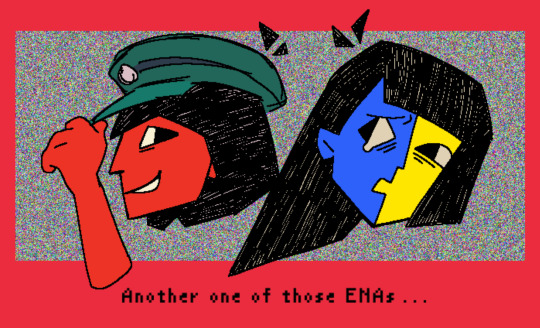
Everybody gangsta until its red yellow and blue
#mits art#ena dream bbq#ena joel g#reference to whos afraid of red yellow and blue#and how ena’s seem to be universally hated
191 notes
·
View notes
Text
I swear that man saying Riri was a stain on Stark's legacy was ridiculous no Tony's actions were a stain on his OWN legacy. Also how come that shady ass professor who stole Riri's work and gave to the government hasn't been mentioned. Riri should have gotten full compensation from the school afor that. I would have SUED HIM.
#iron heart#ironheart#riri williams#natalie washington#black panther#black panter wakanda forever#shuri#princess shuri#namor x shuri#queen ramonda#mit#marvel cinematic universe#marvel#marvel mcu#mcu fandom#mcu#tony stark
74 notes
·
View notes
Text
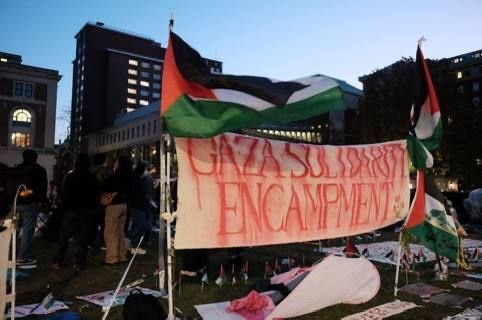
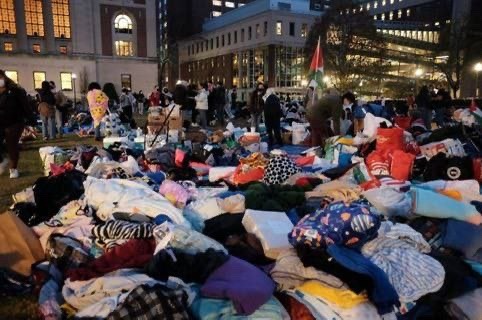
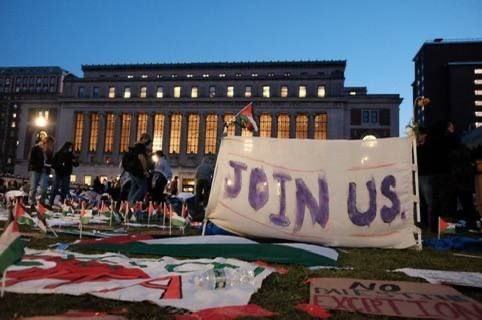


🚨 For the 5th consecutive night, students at Columbia University continue the Gaza Solidarity Encampment, undeterred by over 100 arrests, and returning with larger tents than before.
The students have declared that they will not stop until the University, with its $14 billion endowment, divests from zionism.
Despite a number of suspensions and censorship, students are not backing down. Tour guides for new students have resigned in protest of the repression. Support rallies continue outside the university.
The liberated zone at Columbia has inspired others: At Yale University in Connecticut, an encampment named Gaza Plaza with demands of divestment continues for the third consecutive night despite suspension threats. At Yale, a number of graduate students undertook an 8-day-long hunger strike to demand their university divest from zionism.
Students at the New School in New York also began an encampment, as did a number of students in Boston, creating three encampments at MIT, Emerson, and Tufts to demand divestment and cessation of attacks on students. Encampments are also taking place at the University of North Carolina, Washington University, and Miami University in Ohio.
#palestine#free palestine#gaza#free gaza#jerusalem#israel#tel aviv#gaza strip#from the river to the sea palestine will be free#joe biden#benjamin netanyahu#iof#idf#university#news#breaking news#gaza news#us news#yale university#new school#columbia university#tufts#washington university#university of north carolina#miami university#mit#emerson
347 notes
·
View notes
Text
DEMETRI IS SO CODEPENDENT ON ELI OML
he literally is eli or nothing
he's like tinker bell. if eli doesn't acknowledge him or be physically close to him, he dims and dies
#thinking of another universe where demetri is laying shriveled and sick in his mit dorm room whilst doom scrolling hawk's insta#demetri blasting fourth of july while sobbing at 3am in his mit dorm room#cobra kai#hawk moskowitz#demetri alexopoulos#eli moskowitz#elimetri#hawkmetri#binary boyfriends#binary brothers#cobra kai edit#video edit#edit
80 notes
·
View notes
Text

It’s so unfortunate that there wasn’t a Next Gen Mirror Universe episode, but I think if there was it would have made sense for Lore to have taken Data’s place since all of Lore’s negative attributes would have been praised in the Terran Empire so Dr Soong wouldn’t have had a reason to deactivate him.
I’ve been trying to practice drawing Data (and by extent Lore) so I thought I’d try and do up a design for fun!
Here’s the text written out just in case my hand writing is too hard to read:
*One of the Empires most ruthless
*Like zero regard for organic life
*This does include the rest of the crew to a slightly lesser extent
*If he were to say he was ‘fond’ of any of them it would be Riker and Le Forge
*Constantly exchanging micro aggressions back and forth with Riker, he rest of the crew wouldn’t dare say anything like that to his face
*Doesn’t even need the agonizer he’d just shatter their bones with his bare hands
*Why yes he absolutely would love to take over the Empire, thank you for asking!
#It was only a matter of time before I got my grubby little mits on the mirror universe lol#I held off as long as I could#I also think Tasha Yar would still be security chief#and I have ideas for Troi lol#but idk if I’ll do anything with them#Also apparently there are tie in comics that are tng mirror universe but I don’t have access to those#and I’m unclear on if they’re technically canon or what#so I thought I’d post this before investing further#Star Trek#star trek tng#mirror universe#star trek mirror universe#lore soong#star trek lore#lore star trek#mirror universe Lore#tng#st tng#lore tng#star trek the next generation#terran empire#star trek art
73 notes
·
View notes
Text
Dachte nie das ich mal Osterhasen fanart raushaue

Hab itsy bitsy sketch von fips heute in der Schule gemacht UND OH MEIN GOTT ICH HABE MICH GERADE ERINNERT DAS ICH MORGEN KLASSEARBEIT SCHREIBE; KEIN LANGER TEXT, ICH MUSS?? ÜBEN???
YADA YADA IRGENDWAS WAS ICH VORHATTE ZU ERZÄHLEN HAB NOCH EIN PAAR FILTERN IN IBISPAINT DRAUF GEKLATSCHT JAJA JAJA??? ICH BIN GELIEFERT??😭😭😭🙏
#SCHEIẞE ICH SCHREIB MORGEN DEUTSCH KLASSENARBEIT#ICH HAB MICH KEIN EINZIGES MAL MIT DEM THEMA BESCHÄFTIGT#FANART#MY ART#jcu#fanart#my art#jcu fanart#julien bam cinematic universe#songs aus der bohne#osterhase#jcu osterhase#fips#fips fanart#osterhase fips#bin toll im tags schreiben#ABER NICHT GANZ SO TOLL IN DER DEUTSCH KLASSENARBEIT??
35 notes
·
View notes
Text
how much overlap is there between the dim20 crowd and W359 crowd?? as someone who sits in the center of that venn diagram I keep seeing posts about maxwell on my dash where halfway through reading I'm like, huh, not the pronoun I expected there but cool.
#there's a cloho post about maxwell going to a prestigious university or smth that I keep seeing and going#well of course maxwell went to a prestigious uni!! she went to mit!! and then the he/him pronouns hit and I go ????#waiting for the vice versa when I go... how does a lad like gotch know how to read basic?? oh she/her pronouns?? based transfem rowdy ig#anyways#all you#cloho#people come get into#W359#oooo come closer it's a normal podcast about found family in space and toothpaste
10 notes
·
View notes
Text
Last written only tomodachi island update before I set up a new blog with screenshot updates in English
-
Twilight's favorite foods are Pineapple and Apples.
His absolute worst is FRIED CHICKEN
Twilight why??
-
Ganondorf said that one day he wants to surprise everyone with a sensational action. Help?
-
Sonic's favorite food in Tomodachi... is NOT the hot dog. I'm extremely disappointed. Though I gave him a pan and he cooked an hot dog?? And then he helped Amy cooking in their house
-
I forgot I had gifted Legend, Ravio and Fable some maracas and I found them all playing in Legend’s apartment. Legend was having the time of his life so I guess this is a new headcanon and I'll draw it >:)
-
Ganondorf absolutely doesn't like designer clothes! Maybe a hylian king gifted him a louis vuitton bag and he attacked Hyrule in protest.
-
Time was asleep at the cafè, with Cream and Linkle spying him from a window
#lionessposts#MiT#that's the tag#it means Multiverse island Tomodachi#Multiverse is the name of the island as I have#zelda#sonic#ocs#Linked Universe#linkeduniverse#sonic the hedgehog#I will make a dedocated sideblog since that's the result of the poll#any oppositions?#Or is the tag enough?#lu time#cream the rabbit#ganondorf#lu legend#ravio#lu fable#lu ravio#tomodachi life#linkle#lu linkle#lu twilight
37 notes
·
View notes
Text
Island updates before I go to sleep!
4 of the Zeldas met at the café:
- MC/FS (Dot), back left
- OoT (Lullaby/Sheik) front left
- AlttP/Albw (Fable) front right
- HW (Artemis/Athena) back right


what




then... do something?



Fable, dear, what are you looking at





SHEIK NO
And finally



I need to draw these too, after Legend and Ravio and their maracas... (Yes I haveput the sd card in the pc and I have them in hd too, I'll make a post tomorrow!)
#lionessposts#mit#linked universe#linkeduniverse#lu lullaby#sheik#malon#lu fable#lu dot#zelda#the legend of zelda#lu artemis
25 notes
·
View notes
Text
MANN IM MOND AKT 6 SPOILER
• Miami Rose wurde gerade erst Captain und hat ihre Position direkt wieder verloren.
• Piet lebt wieder auf der Straße und bettelt um Geld, doch diesmal könnte es sein, dass ihn niemand aufnimmt, so wie es Oskar getan hat.
• Fips hatte nie die Chance, sich bei seinen Brüdern dafür zu entschuldigen, dass er den Kontakt abgebrochen hat und er konnte ihnen nicht mehr sagen, wie sehr er sie liebt.
• Eos konnte sich nicht bei seinen Brüdern für das, was er getan hat, entschuldigen und die Wächter konnten sich für ihre Taten ebenfalls nicht entschuldigen.
• Eos und die Wächter kannten sich so gut wie gar nicht mehr und hatten nie die Gelegenheit, sich wieder richtig kennenzulernen. Die Wächter kannten nur den Eos aus ihrer Kindheit – aber Menschen verändern sich mit der Zeit...
• Klaus, Ruhn, Zeke und Fips hatten sich wahrscheinlich lange nicht mehr gesehen. Und als sie sich endlich wiedersahen, war es unter schlechten Umständen (Um ihren Bruder wieder zu verbannen) und nur für kurze Zeit, denn kurz darauf starben sie.
• Iris konnte ihre zweite Chance zu leben nur für kurze Zeit genießen.
#viel spaß mit diesen infos <3#der mann im mond#mann im mond#songs aus der bohne#jcu#juliens cinematic universe#julien bam#proxyeve
19 notes
·
View notes
Text
by Dion J. Pierre
The author, PhD candidate Prahlad Iyengar, continued, “One year into a horrific genocide, it is time for the movement to begin wreaking havoc, or else, as we’ve seen, business will indeed go on as usual … As people of conscience in the world, we have a duty to Palestine and to all the globally oppressed. We have a mandate to exact a cost from the institutions that have contributed to the growth and proliferation of colonialism, racism, and all oppressive systems. We have a duty to escalate for Palestine, and as I hope I’ve argued, the traditional pacifist strategies aren’t working because they are ‘designed into’ the system we fight against.”
In a statement distributed by the CAA, Iyengar accused MIT of weaponizing the disciplinary system to persecute him.
“On Friday, MIT administration informed me that as a result of this article, I have been banned from campus without due process and that I face potential expulsion or suspension,” he said. “These extraordinary actions should concern everyone on campus. My article attempts a historical review of the type of tactics used by protest movements throughout history, from the civil rights movement to the struggle to the fight [sic] against South African Apartheid here on MIT campus.”
MIT has not responded to The Algemeiner‘s inquiry regarding Iyengar’s punishment, but according to excerpts of its letter to Iyengar, the administration told him the article “makes several troubling statements” and could be perceived as “a call for more violent or destructive forms of protest at MIT.” In retaliation, CAA is calling on students to harass David Randall, an associate dean, until he relents and revokes Iyengar’s punishment and Written Revolution‘s temporary suspension.
“On Pacifism” is not the first time that elite college students have endorsed violence in the name of opposing Israel and furthering the Palestinian cause.
In September, during Columbia University’s convocation ceremony, Columbia University Apartheid Divest (CUAD), a group which recently split due to racial tensions between Arabs and non-Arabs, distributed literature calling on students to join the Palestinian terrorist group Hamas’s movement to destroy Israel.
“This booklet is part of a coordinated and intentional effort to uphold the principles of the thawabit and the Palestinian resistance movement overall by transmitting the words of the resistance directly,” said the pamphlet distributed by CUAD, a Students for Justice in Palestine (SJP) spinoff, to incoming freshmen. “This material aims to build popular support for the Palestinian war of national liberation, a war which is waged through armed struggle.”
Other sections of the pamphlet were explicitly Islamist, invoking the name of “Allah, the most gracious” and referring to Hamas as the “Islamic Resistance Movement.” Proclaiming, “Glory to Gaza that gave hope to the oppressed, that humiliated the ‘invincible’ Zionist army,” it said its purpose was to build an army of Muslims worldwide.
17 notes
·
View notes
Text
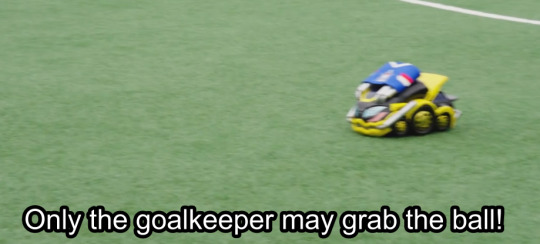
#bakuage sentai boonboomger#yarucar#why did they just stick a mit on his head#im dying#they just stuck him in the field#idk how useful he'll be guys#super sentai#edit: ITS A JERSEY???#ITS A MINI JERSEY THATS ADORABLE#how expensive was that to get custom made(in universe)#or did they just take a baby's uniform
10 notes
·
View notes
Text
"Last week, the presidents of Harvard, MIT, and the University of Pennsylvania were called to testify before Congress about the alarming rise of anti-Semitism on their campuses, and their tepid responses to it, in the wake of October 7.
By now, you have probably heard about the trio’s horrendous overall performance, punctuated by their smug inability to respond to the simple question of whether calling for the genocide of Jews violates their schools’ codes of conduct. Since that time, the president of UPenn has stepped down, and support for the other two is wavering.
In case you are wondering, their answer should have been an unequivocal “yes, it violates our polices.” The right to free speech is fundamental, but it does have limits: The First Amendment is not a pass to threaten, harass, intimidate or otherwise violate the rights of others.
For the record, even those pundits who (incorrectly) defended the university presidents’ testimony as being legally correct, if morally tone deaf, had to admit that it did represent a glaring double standard. Each of these universities has in recent years protected other minority groups from even “micro-aggressions” by effectively and ruthlessly shutting down speech that their leaders find offensive.
Struggling to answer whether calls for genocide against Jews constitutes bullying, after you have already officially labeled “fatphobia” as “violence” and “using the wrong pronoun” as a form of “abuse,” is pathetic, and to see these schools pretending that they are genuinely concerned about free speech all of a sudden is nothing short of laughable. In the Foundation for Individual Rights and Expression’s 2024 College Free Speech Rankings, for example, out of 248 US campuses, Penn and Harvard were ranked 247th and 248th, respectively. If you are only concerned about shutting down speech when that speech targets Jews, well, there is a word for that.
How Free Is Free Speech?
The First Amendment does not protect trespassing, vandalism, harassment, assault, or the destruction of property. Nor does it protect speech that is not meant to inform or persuade, but to disrupt lawful endeavors —activities like going to the kosher dining hall or studying in a library. The First Amendment does not protect someone who is making true threats, nor does it protect intimidation — “a type of true threat, where a speaker directs a threat to a person or group of persons with the intent of placing the victim in fear of bodily harm or death.”
Just a few months ago, in Counterman v. Colorado (2023), the United States Supreme Court clarified that this does not necessarily mean that the person speaking actually intended to threaten the victim. Rather, the Court imposed a recklessness standard — i.e., the First Amendment does not protect a person who consciously disregards a substantial risk that his communications would be viewed as threatening violence. To be clear, calling for the genocide of Jews, as the pro-Hamas student groups on campus have consistently been doing, does create a hostile environment for Jewish people on campus, violates Title VI of the Civil Rights Act of 1964, and is not protected by the First Amendment.
It was obvious that all three university presidents were reading off scripts written by their respective attorneys (several of whom were sitting behind them and nodding throughout the hearing). The question then becomes: What now? What is the critical error that their lawyers (and the general counsels at other universities where Jewish students are being targeted) have made in failing to stand up for Jewish people, and how should they immediately correct it?
The answer is simple, and it is exactly what students, parents, donors, and the government alike should all be demanding from these institutions: They should continue to respect the First Amendment, but they should apply the appropriate standard for speech on a campus.
From a legal perspective, it is easy to see where the university legal counsels’ confusion specifically arose. Those horrible answers were written under the assumption that the only limits a university can put on student speech are the limits contemplated in the foundational Supreme Court First Amendment case of Brandenburg v. Ohio (1969).
In that case, regarding speech at a KKK rally, the Court held that a state could only punish speech that “is directed to inciting or producing imminent lawless action and is likely to incite or produce such action.” Brandenburg is famously a very high standard, and that is precisely where the universities are hiding: Despite the hundreds of anecdotal incidents from the last two months, and notwithstanding all of the well-known studies confirming that inflammatory discriminatory anti-Semitic rhetoric leads directly to anti-Semitic violence, officials are telling students and parents and now Congress that their hands are tied because, in most cases, there has not been direct enough incitement.
Campus Standards Are Different
Now, the truth is that even under the Brandenburg standard, schools can still impose reasonable time, place, and manner restrictions. As the Court in Grayned v. City of Rockford (1972) explained: “The crucial question is whether the manner of expression is basically incompatible with the normal activity of a particular place at a particular time.”
So even under that paradigm, any activities that disrupt the educational enterprise and functioning of a school may be restricted. Common sense dictates that rallies celebrating calls for anti-Semitic genocide disrupt the educational enterprise and functioning of a school because they leave some students genuinely fearful for their lives.
But that argument is also unnecessary, because Brandenburg is absolutely the wrong standard for schools to be using, and university presidents and lawyers need to correct that mistake as soon as possible.
In Tinker v. Des Moines (1969), the Supreme Court explained that the Constitution does allow for schools to shut down speech that will “materially and substantially interfere” with the “requirements of appropriate discipline” in the operation of the school” or that “invad[es] the rights of others.” That is the standard that these schools must now vigilantly enforce.
Of course, private colleges and universities, like Harvard, Penn, and MIT, can restrict certain speech, conduct, and demonstrations, in most cases, without triggering any constitutional issues. But even a public university is not a public street, and the rules for what speech must be allowed on each are very different.
The Supreme Court in Healy v. James (1972) cited Tinker to hold that university officials do not have to tolerate student activities that breach reasonable campus rules; interrupt the educational process; or interfere with other students’ rights to receive an education. (This is especially true when the student speech is happening in school-sponsored forums, or is reasonably perceived as somehow bearing the school’s imprimatur.)
The Court has also repeatedly held (in Bethel v. Fraser [1986] and Hazelwood v. Kuhlmeier [1988]) that schools have even greater latitude to limit student expression if they can establish a “legitimate pedagogical concern.” Ensuring that all students — including Jewish students — have a safe and harassment-free environment in which to learn should be an overwhelmingly legitimate pedagogical concern.
Under the Tinker line of cases, schools do not even have to wait for a breach to actually occur; administrators can act if they can “reasonably forecast” that the expression in question would disrupt school discipline or operation, or violate the rights of other students. In Melton v. Young, for example, the Court ruled that schools could prohibit the wearing of a Confederate flag jacket because it was reasonable to assume that it would be disruptive in an environment of heightened racial tension.
Waving a Hamas flag and cheering on slaughter, as bodies are still being identified and hostages are still being held, announcing solidarity with the “resistance” and that “armed struggle” — i.e., murder —“is “legitimate,” and yes, calling for the genocide of Jews, are all behaviors that are no less likely to cause a disruption than a jacket.
Tinkering with Free Speech
Under Tinker, it is more than reasonable to forecast that there will be substantial disruptions that would violate the right of Jewish students to a non-hostile educational environment if groups are allowed to host events that glorify and celebrate the murder of Jews.
Schools can and must act now to prevent that from continuing to happen, using both common sense and the relevant case law to draw the appropriate line. The limits on the First Amendment are there to help the government with its primary responsibility —to protect all of its citizens from harm —and authorities must be constantly vigilant to enforce the law correctly.
Regardless, the answer to “what now?” then, is this: Everyone calling for change should articulate what that change is, and institutions fixing their policies should clearly explain how they will “tinker” with their free speech formulas so that the next time their leaders are asked if calling for a Jewish genocide is problematic, the answer can just be “yes.”
-Goldfeder, M. (2023g, December 13). Poison Ivies - Mishpacha Magazine. Mishpacha Magazine - The premier Magazine for the Jewish World. https://mishpacha.com/poison-ivies/
80 notes
·
View notes
Text

So I like to think post Chosen Kennedy and Willow are long distance for a bit, Kennedy's busy on the Cleveland Hellmouth, Willow gets to go back to uni and finish her education, at I dunno MIT doing cool techno witch stuff, now that everything's not so dire that she needs to be on hand for magic solutions. And that she's not in quite so dire a place. Anyway this is them meeting up for the first time in a few months. Willow's roommate is exiled for the night and then the day after she's showing off her super cool super powered hot girlfriend who totally exists she just lives in Cleveland and fights vampires to all the friends she's made at uni.
#i don't know american geography if cleveland is close to mit then willow went to some other university#yes willow got some piercings and she got them specifically for this night kennedy loves them willow is also enjoying kennedy loving them#btvs#btvs fanart#buffy the vampire slayer#willow rosenberg#kennedy btvs#willowxkennedy#art#my art#also it's just been thinking about kennedy hours again with some headcanon there as an excuse to draw her and willow kissing#which in of itself was just an excuse to practice drawing kissing#but i do stand by the headcanon#why did i put so much detail into that tiny braid#everyone zoom in on kennedy's hair so you can see the braid#i am meant to be working on my ten page fuffy comic but i have one panel left i need to draw#and the practice is essential for that panel
5 notes
·
View notes